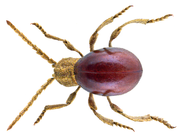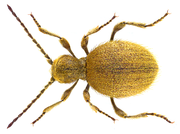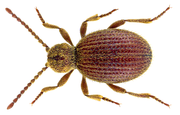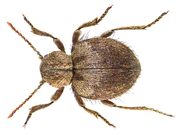Spider beetle
| Ptininae, Spider beetle | |
|---|---|

| |
| Niptus hololeucus | |
| Scientific classification | |
| Domain: | Eukaryota |
| Kingdom: | Animalia |
| Phylum: | Arthropoda |
| Class: | Insecta |
| Order: | Coleoptera |
| Superfamily: | Bostrichoidea |
| Family: | Ptinidae |
| Subfamily: | Ptininae Latreille, 1803 |

Spider beetles make up the subfamily Ptininae, in the family Ptinidae. There are approximately 70 genera and 600 species in the subfamily, with about 12 genera and 70 species in North America north of Mexico.[1][2][3][4][5]
Spider beetles have round bodies with long, slender legs. Many species are flightless, either in females only or both sexes. They are generally 1–5 mm long, and reproduce at the rate of two to three generations per year. They are so named because of a resemblance to spiders. Some species have long legs, antennae that can seem like an additional pair of legs, and a body shape that may appear superficially like that of a spider.[4]
The larvae and the adults of most spider beetles are scavengers on dry plant or animal matter, but some species are known to be ant associates.[4]
The subfamily Ptininae, along with Anobiinae and several others, were formerly considered members of the family Anobiidae, but the family name has since been changed to Ptinidae.[5][2][3][4][1]
Genera
These genera belong to the subfamily Ptininae:[6][7]
- Acanthaptinus Philips, 2005
- Africogenius Borowski, 2000
- Bellesus Özdikmen, 2010
- Casapus Wollaston, 1862 g
- Cavoptinus Pic, 1931
- Chilenogenius Pic, 1947
- Coleoaethes Philips, 1998 g
- Cryptopeniculus Philips, 2004 g
- Cylindroptinus Pic, 1910
- Cyphoniptus Bellés, 1992
- Dignomus Wollaston, 1862 g
- Diphobia Olliff, 1886
- Diplocotes Westwood, 1869 g
- Diplocotidus Peringuey, 1899
- Ectrephes Pascoe, 1866 g
- Enasiba Olliff, 1886
- Epauloecus Mulsant & Rey, 1868 b
- Eurostodes Reitter, 1884 g
- Eurostoptinus Pic, 1895
- Gibbium Scopoli, 1777 i c g b
- Gnostus Westwood, 1855 i c g b
- Hanumanus Bellés, 1991
- Hexaplocotes Lea, 1906
- Kedirinus Bellés, 1991 g
- Lachnoniptus Philip, 1998 g
- Lapidoniptus Belles, 1981 g
- Luzonoptinus Pic, 1923
- Maheoptinus Pic, 1903
- Meziomorphum Pic, 1898 g
- Mezium Curtis, 1828 i c g b
- Myrmecoptinus Wasmann, 1916 g
- Neoptinus Gahan, 1900
- Niptinus Fall, 1905 i c g b
- Niptodes Reitter, 1884 g
- Niptomezium Pic, 1902
- Niptus Boieldieu, 1856 i c g b
- Okamninus Mynhardt & Philips, 2013 g
- Oviedinus Bellés, 2010 g
- Paulianoptinus Bellés, 1991
- Paussoptinus Lea, 1905
- Piarus Wollaston, 1862 g
- Pitnus Gorham, 1883 i c g
- Polyplocotes Westwood, 1869
- Prosternoptinus Bellés, 1985
- Pseudeurostus Heyden, 1906 i c g b
- Ptinus Linnaeus, 1766 i c g b
- Silisoptinus Pic, 1917
- Singularivultus Bellés, 1991
- Sphaericus Wollaston, 1854 i c g b
- Stereocaulophilus Belles, 1994 g
- Sucinoptinus Bellés, 2007 g
- Sulcoptinus Bellés, 1988 g
- Tipnus Thomson, 1863 i c g
- Trigonogenioptinus Pic, 1937
- Trigonogenius Solier, 1849 i g b
- Tropicoptinus Belles, 1998 g
- Trymolophus Bellés, 1990 g
- Xylodes Waterhouse, 1876 g
Data sources: i = ITIS,[8] c = Catalogue of Life,[9] g = GBIF,[10] b = Bugguide.net[1]
Gallery
-
Ptinus fur female
-
Ptinus fur male
See also
References
- ^ a b c "Ptininae Subfamily Information". BugGuide.net. Retrieved 2018-08-29.
- ^ a b Bell, Karen Leanne; Philips, T. Keith (2011). "Molecular systematics and evolution of the Ptinidae (Coleoptera: Bostrichoidea) and related families" (PDF). Zoological Journal of the Linnean Society. 165: 88–108. doi:10.1111/j.1096-3642.2011.00792.x.
- ^ a b
Löbl, Ivan; Smetana, Aleš (2007). Lobl, I.; Smetana, A. (eds.). Catalogue of Palaearctic Coleoptera. doi:10.1163/9789004260894. ISBN 978-87-88757-67-5.
{{cite book}}:|journal=ignored (help) - ^ a b c d Arango, Rachel A.; Young, Daniel K. (2012). "Death-watch and spider beetles of Wisconsin (Coleoptera: Ptinidae)" (PDF). General Technical Report FPL-GTR-209.
- ^ a b Bouchard, Patrice; Bousquet, Yves; Davies, Anthony E.; Alonso-Zarazaga, Miguel A.; et al. (2011). "Family-group names in Coleoptera (Insecta)". ZooKeys (88): 1–972. doi:10.3897/zookeys.88.807. ISSN 1313-2989. PMC 3088472. PMID 21594053.
- ^ "Fauna Europaea, Ptininae". Retrieved 2018-08-29.
- ^ "BioLib.cz, Ptininae Latreille, 1802". Retrieved 2018-08-29.
- ^ "ITIS, Integrated Taxonomic Information System". Retrieved 2018-08-29.
- ^ "Catalogue of Life". Retrieved 2018-08-29.
- ^ "GBIF". Retrieved 2018-08-29.
External links
- "Spider beetle". Iowa State University. 2005-07-14. Retrieved 2018-08-29.
- Steve Jacobs (October 2006). "Spider beetles". Pennsylvania State University. Retrieved 2018-08-29.
- "Spider beetle". Encyclopædia Britannica. Retrieved 2018-08-29.
- "Ptinidae photo page". Retrieved 2018-08-29.












